Premium Psychological
Assessment Tools
Professional-grade psychological tests and inventories for researchers, clinicians, and educational institutions.
Our Psychological Tests
Explore our comprehensive collection of validated psychological assessment tools
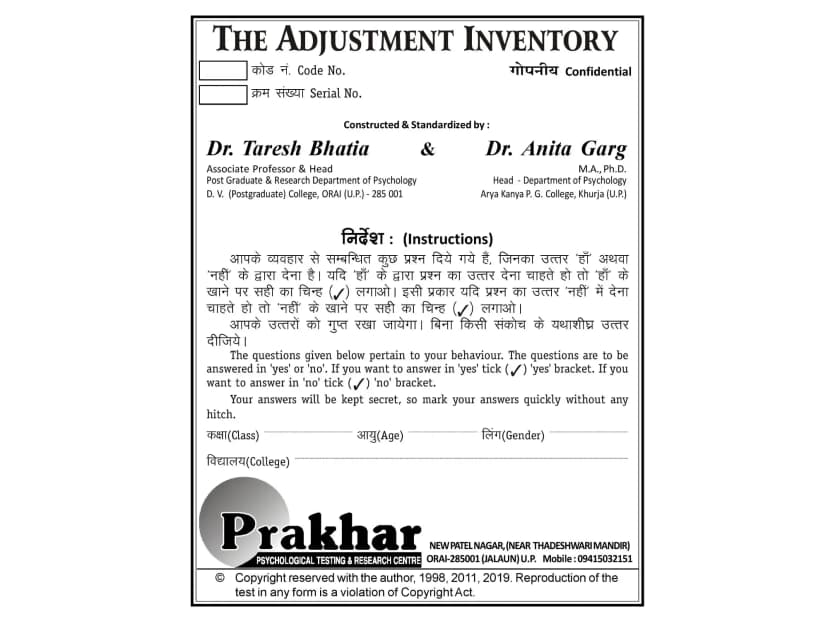
The Adjustment Inventory
The Adjustment Inventory is a psychological tool designed to assess adjustment levels in individuals aged 15-21 across five key areas. The inventory consists of 50 items presented in a yes/no format and is available in both Hindi and English, ensuring accessibility for a diverse population. The inventory has been developed with high reliability and validity for use in educational and clinical settings. Five Important Areas Measured by the Adjustment Inventory: 1. Home Adjustment: Assesses the individual's ability to adapt to family dynamics, household environment, and relationships with family members. 2. Educational Adjustment: Measures how well the individual adjusts to academic demands, school environment, and relationships with teachers and peers. 3. Social Adjustment: Evaluates the ability to interact and build relationships with others outside the family, including friends and community members. 4. Emotional Adjustment: Assesses how well the individual manages emotional responses, including stress, anxiety, and coping mechanisms in various situations. 5. Health Adjustment: Focuses on the individual's physical well-being, including their approach to health management, illness, and overall physical fitness. This inventory helps identify areas where individuals may need support, contributing to better mental health and well-being interventions for adolescents and young adults.
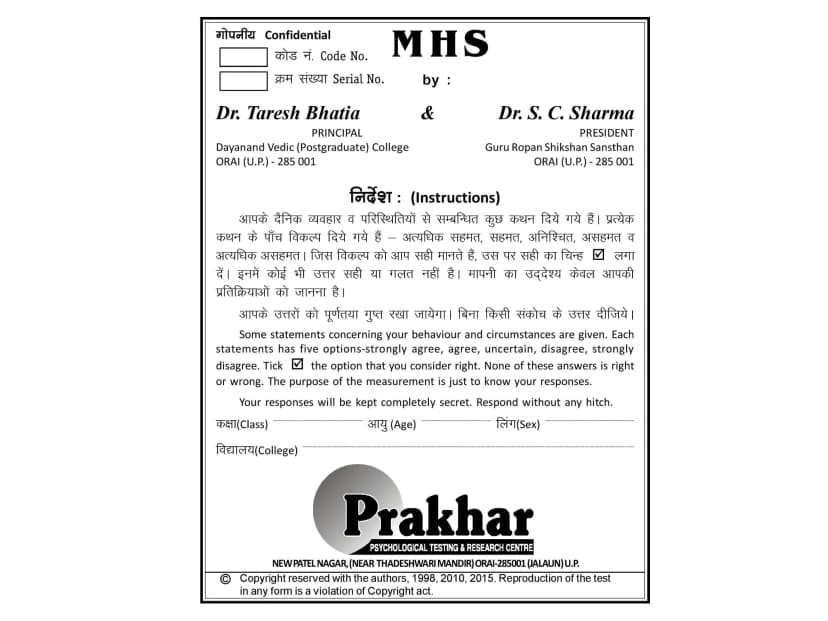
Mental Health Scale (MHS)
The Mental Health Scale is designed to assess mental health across five important dimensions for individuals aged 15-35. It consists of 50 items in a Likert-type rating scale, allowing respondents to express varying degrees of agreement. The scale is available in both Hindi and English and demonstrates high reliability and validity. Five Dimensions Measured by the Mental Health Scale: 1. Realistic: Assesses the ability to perceive and deal with situations pragmatically, maintaining a grounded view of reality. 2. Joyful Living: Measures the presence of positive emotions, happiness, and an overall sense of well-being. 3. Autonomy: Evaluates independence in decision-making and the ability to function without excessive reliance on others. 4. Emotional Stability: Assesses the ability to manage emotions effectively, maintaining balance during stressful or challenging situations. 5. Social Maturity: Measures adaptability and responsibility in social situations, including effective communication and interpersonal skills. This scale is useful for identifying aspects of mental health that can be nurtured or supported, contributing to overall psychological well-being.
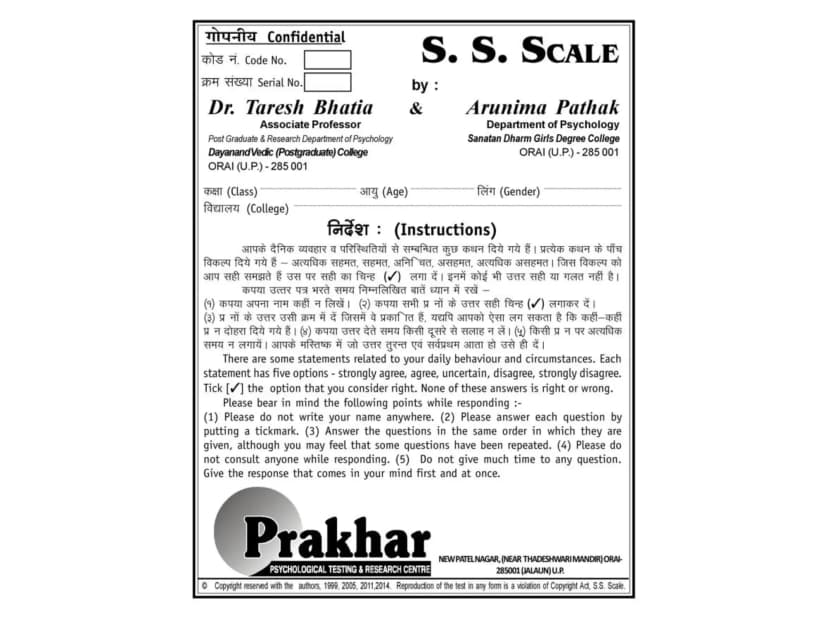
Students' Stress Scale (S.S. Scale)
The Students' Stress Scale is designed to measure stress levels among students aged 16-21 across six key areas. This scale consists of 30 items presented in a Likert-type rating format, allowing students to indicate the degree of stress they experience in each area. The scale is bilingual (Hindi & English) and demonstrates high reliability and validity for assessing stress. Six Important Areas Measured by the Students' Stress Scale: 1. Academic Stress: Assesses stress related to academic performance, exams, assignments, and educational expectations. 2. Financial Stress: Measures stress due to financial constraints, including managing personal expenses and tuition fees. 3. Vocational Stress: Focuses on stress related to career choices, job opportunities, and future vocational aspirations. 4. Family Stress: Evaluates stress originating from family dynamics, expectations, and responsibilities at home. 5. Social Stress: Assesses stress linked to social relationships, peer pressure, and interactions within the social environment. 6. Emotional Stress: Measures stress associated with emotional regulation, anxiety, and coping with personal challenges. This scale is an important tool for identifying the specific stressors affecting students, facilitating targeted interventions and support for managing stress effectively.
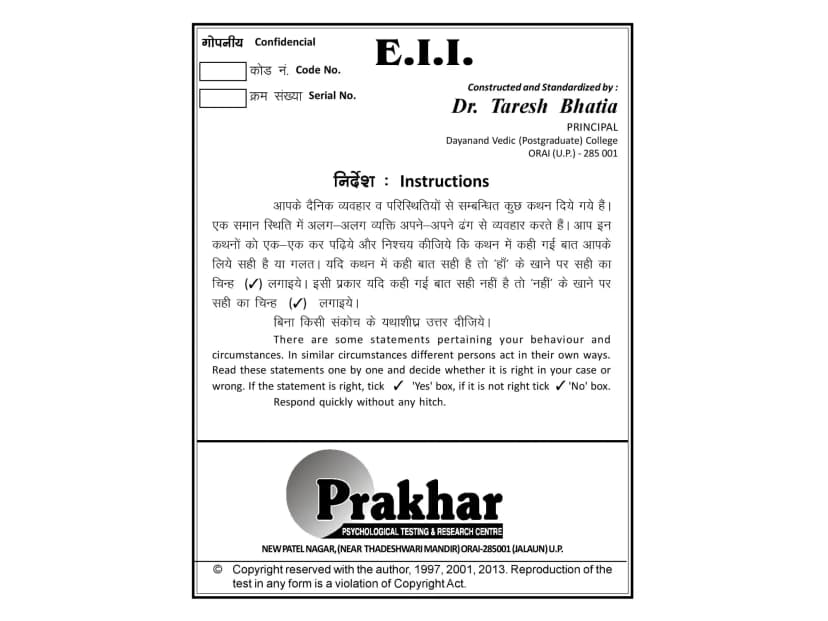
Extraversion Introversion Inventory (E.I.I.)
The Extroversion-Introversion Inventory is a psychological tool designed to assess personality traits related to extroversion and introversion for individuals aged 16-45. The inventory consists of 30 items presented in a yes/no format and is available in both Hindi and English, ensuring accessibility for a wider population. It has been developed with high reliability and validity. Key Focus: • Extroversion: Measures tendencies toward sociability, assertiveness, and preference for social interactions. • Introversion: Assesses tendencies toward solitude, introspection, and preference for less social engagement. This inventory helps to identify personality inclinations, providing insights that can be useful for personal development, counseling, and career guidance.
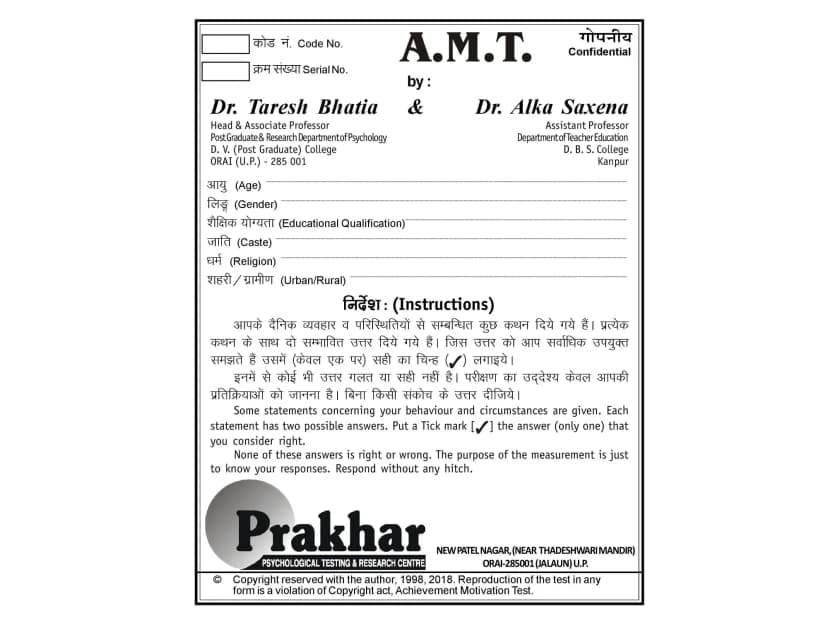
Achievement Motivation Test (AMT)
The Achievement Motivation Test is designed to assess achievement motivation in individuals aged 15-20. The test includes 25 items, each with two response alternatives, making it straightforward for respondents to complete. The test is bilingual (Hindi & English) and has high reliability and validity. Key Focus: • Achievement Motivation: Measures the drive to achieve goals, work hard, and strive for success. High scores on this test are indicative of a strong motivation for future occupational success. This test is valuable for identifying individuals with a high potential for success in academic and career pursuits.
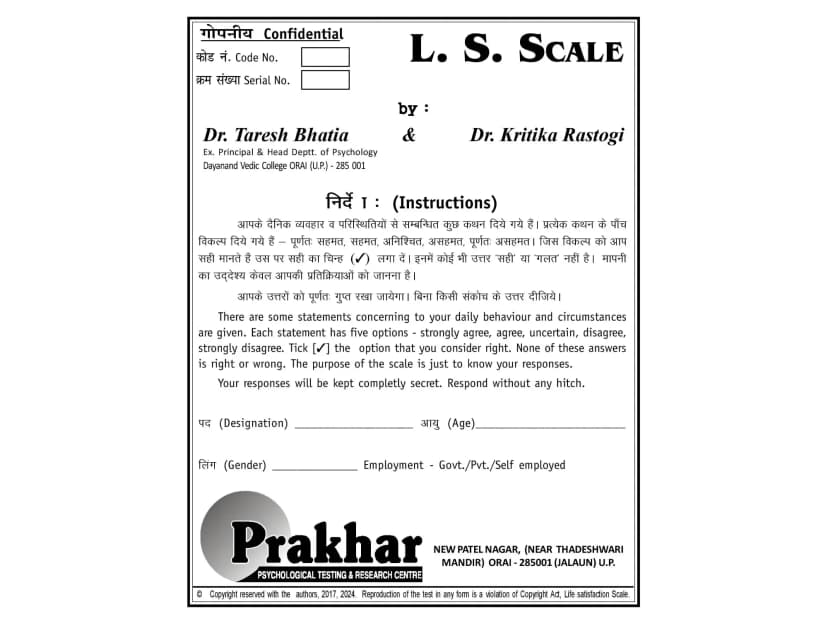
Life Satisfaction Scale (L.S Scale)
The Life Satisfaction Scale is designed to assess life satisfaction across seven important areas for individuals aged 20-55. The scale consists of 56 items presented in a Likert-type rating format and is available in both Hindi and English. It has been developed with high reliability and validity. Seven Important Areas Measured by the Life Satisfaction Scale: 1. Health: Assesses the individual's satisfaction with their physical well-being and overall health. 2. Family & Social Support: Evaluates satisfaction with family relationships, social connections, and the support system. 3. Financial Stress: Measures the impact of financial constraints and the level of satisfaction with financial stability. 4. Joyful Living: Assesses the presence of positive emotions and overall happiness in day-to-day life. 5. Everyday Life Pleasure: Focuses on the enjoyment and satisfaction derived from daily activities and routines. 6. Meaningful Life: Measures the sense of purpose and fulfillment in life. 7. Happy & Optimistic: Assesses general optimism, positive outlook, and life satisfaction. This scale helps provide a comprehensive view of an individual's life satisfaction and can guide interventions aimed at enhancing well-being.
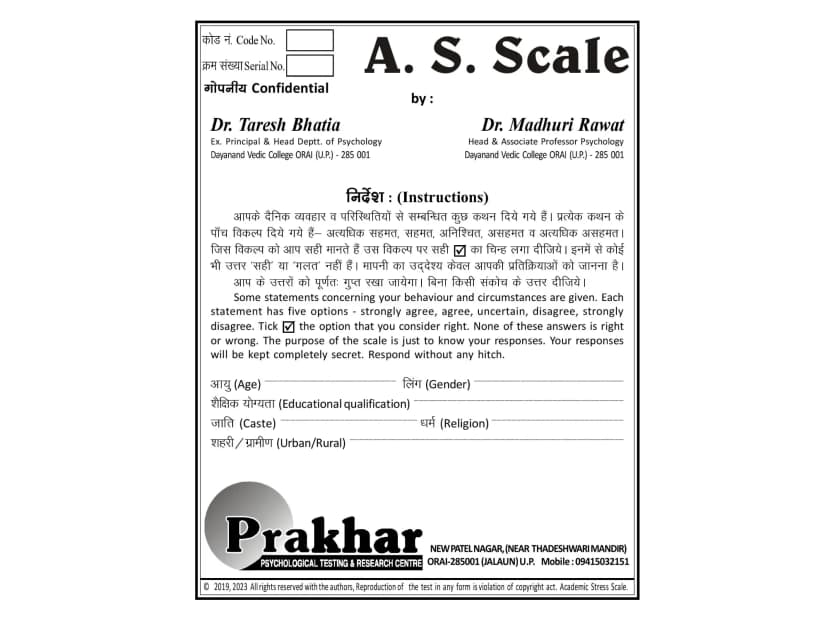
Academic Stress Scale (A.S Scale)
The Academic Stress Scale is designed to assess academic stress in individuals aged 16-22, focusing on three key areas. The scale consists of 30 items presented in a Likert-type rating format, allowing respondents to rate their level of stress. It is bilingual (Hindi & English) and demonstrates high reliability and validity. Three Important Areas Measured by the Academic Stress Scale: 1. Academic Pressure: Assesses stress related to academic demands, expectations, and the pressure to perform well in exams and assignments. 2. Academic Conflict & Frustration: Measures stress stemming from conflicts in academic settings, such as disagreements with teachers or peers, and frustration over unmet academic goals. 3. Family Problems & Financial Stress: Evaluates stress arising from family issues and financial challenges that impact academic performance. This scale is a valuable tool for identifying specific sources of academic stress and providing insights into how students can be supported in managing their stress.
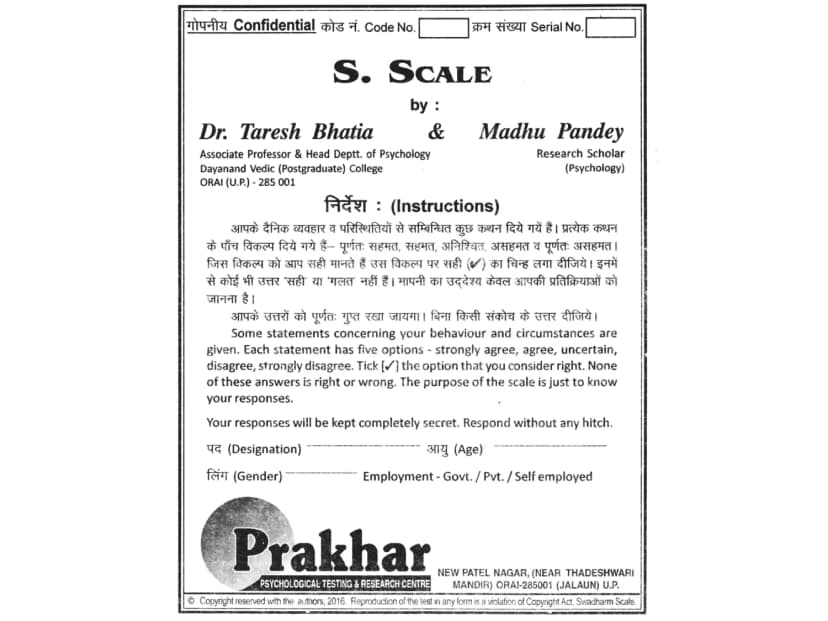
Swadharma Scale (S.Scale)
The Swadharma Scale is designed to measure an individual's adherence to their personal duties and responsibilities (Swadharma) across five key areas for individuals aged 20-55. The scale consists of 50 items in a Likert-type rating format and is available in both Hindi and English. It has high reliability and validity. Five Important Areas Measured by the Swadharma Scale: 1. Devotee Parents: Assesses the individual's sense of duty and commitment toward their parents. 2. Siblings: Measures the level of responsibility and care toward siblings. 3. Spouse: Evaluates commitment, duty, and care in marital relationships. 4. Children: Assesses the individual's sense of responsibility and devotion to their children. 5. Job Commitment: Measures the degree of dedication and responsibility toward one's job. Higher scores on this scale reflect a greater degree of sound mental health with minimal conflict, frustration, and stress, indicating alignment with one's duties in these areas.
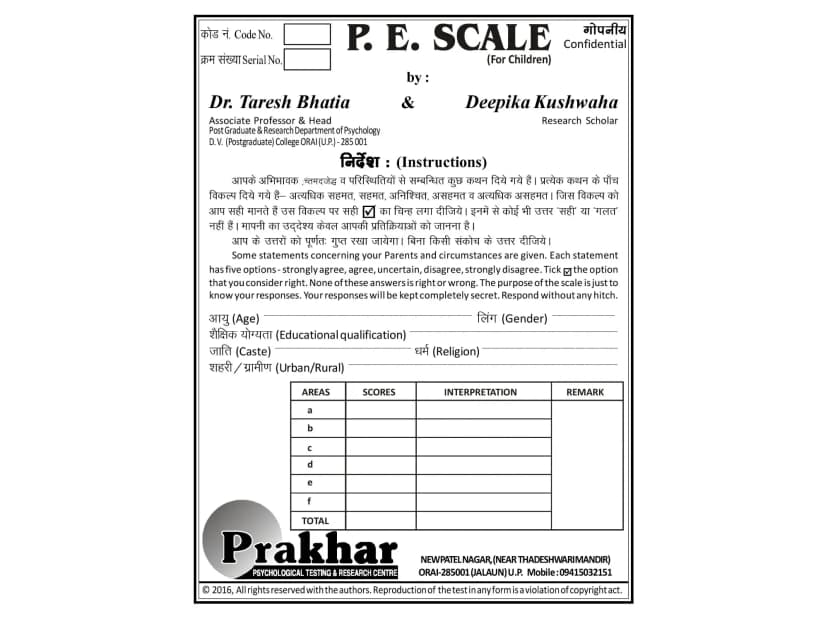
Parental Expectation Scale (P.E Scale)
The Parental Expectations Scale is designed to assess the various factors of parental expectations for both children and parents, measured across six key areas. This scale is administered separately to children and parents, providing insights into potential areas of conflict or alignment. The scale consists of 30 items for each group in a Likert-type rating format, and is bilingual (Hindi & English), with high reliability and validity. Six Important Areas Measured by the Parental Expectations Scale: 1. General Expectation: Assesses broad, overarching expectations that parents have for their children's overall development. 2. Social Expectation: Evaluates expectations related to social behavior, interactions, and societal roles. 3. Financial Expectation: Measures parental expectations concerning financial responsibility, stability, and future earnings. 4. Good Academic Success: Focuses on the importance placed on academic achievement and success in school or college. 5. Future Job: Assesses expectations regarding career choices and professional success. 6. Personal Expectation: Evaluates expectations related to personal growth, values, and character development. This scale is particularly useful for understanding and managing the conflicts that can arise when parental expectations and children's aspirations differ.
Latest Insights
Explore our latest articles on psychological testing, mental health, and personal development

How Adjustment Shapes a Young Adult's Success
Discover how psychological adjustment during young adulthood becomes the foundation for lifelong success, career achievement, and personal fulfillment.

5 Dimensions of Mental Health Everyone Should Understand
Explore the five essential dimensions of mental health: emotional, psychological, social, spiritual, and physical. Learn how they interconnect and impact overall well-being.

Hidden Stressors Students Face in Today's Academic World
Discover the hidden stressors affecting students today: digital overload, perfectionism, social comparison, financial pressure, and more. Learn how to identify and address these challenges.
About Prakhar Psychological Testing
We specialize in providing high-quality psychological assessment tools for professionals in research, clinical practice, and education. Our tests are validated, culturally adapted, and available in multiple languages.
Learn More About Us